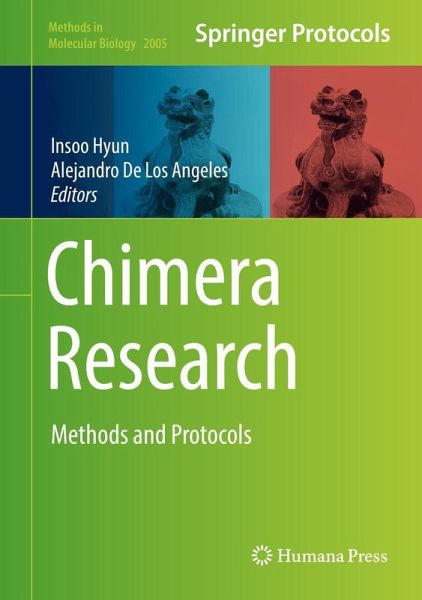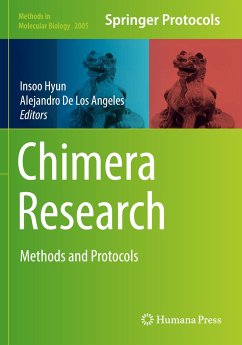
Chimera Research
Methods and Protocols
Herausgegeben: Hyun, Insoo; De Los Angeles, Alejandro

PAYBACK Punkte
61 °P sammeln!
This volume addresses challenging new questions surrounding stem cell-based chimera research. This book is organized into three parts: Part One provides readers with a summary of different human donor cell types. The chapters in this section discuss ways to evaluate new types of pluripotent stem cells; the derivation of naïve and primed pluripotent stem cells from mouse preimplantation embryos; and the ethical and regulatory complexities of informed consent for the procurement of somatic cells. Part Two discusses methods for generating chimeras. The chapters here look at chick models and huma...
This volume addresses challenging new questions surrounding stem cell-based chimera research. This book is organized into three parts: Part One provides readers with a summary of different human donor cell types. The chapters in this section discuss ways to evaluate new types of pluripotent stem cells; the derivation of naïve and primed pluripotent stem cells from mouse preimplantation embryos; and the ethical and regulatory complexities of informed consent for the procurement of somatic cells. Part Two discusses methods for generating chimeras. The chapters here look at chick models and human-chick organizer grafts; generating human-pig interspecies chimeras; and techniques for transplanting mouse neural stem cells into a mouse disease model for stroke. Part Three concludes the book with a look at ongoing ethical controversies and new scientific directions. Chapters in this part cover the ethics of crossing the xenobarrier; animal welfare; experimentation with spermatogonialstem cells; and cautious approaches to human-monkey chimera studies to further understand complex human brain disorders. Written in the highly successful Methods in Molecular Biology series format, chapters include introductions to their respective topics, lists of the necessary materials and reagents, step-by-step, readily reproducible laboratory protocols, and tips on troubleshooting and avoiding known pitfalls.
Cutting-edge and thorough, Chimera Research: Methods and Protocols is a valuable resource for scientists interesting in using chimeras as a research tool while also taking into consideration their complex ethical scopes.
Cutting-edge and thorough, Chimera Research: Methods and Protocols is a valuable resource for scientists interesting in using chimeras as a research tool while also taking into consideration their complex ethical scopes.












